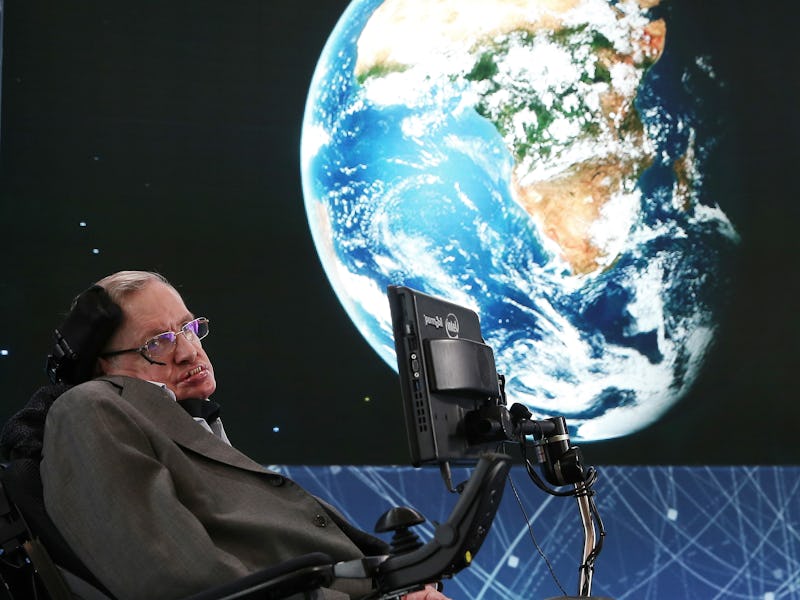Stephen Hawking Says We Should Hope Aliens Don't Find Us First
The probability of finding alien life is low. Probably.

Theoretical physicist Stephen Hawking reminded us of his opinion about aliens today in New York when he told reporters that we should hope that aliens don’t find us — because it’d likely spell doom for humans.
Hawking was part of an esteemed group of scientists that announced the space exploration project Breakthrough Starshot. Funded by billionaire Yuri Milner, the program aims to send light-propelled nanocrafts to our nearest star system, Alpha Centauri.
Near the end of the press conference, Hawking was given the floor to answer pre-selected questions from journalists (because he attended the opera on Monday night, he didn’t have time to consider all of them).
And because people tend to treat Hawking like a crystal ball, most of the questions dealt with extraterrestrial life and our own roles in the universe. One thing he wanted to make clear: While we may be on the hunt for aliens, we should hope they don’t find us first.
After the initial shock of considering our demise by aliens wears off, we shouldn’t consider his comments on Tuesday too surprising.
Since 2010, Hawking has been public about his concerns that an advance alien civilization could try to kill us all. Hawking said of aliens then: “I imagine they might exist in massive ships, having used up all the resources from their home planet. Such advanced aliens would perhaps become nomads, looking to conquer and colonise whatever planets they can reach.”
Hawking also said this during a Discovery Channel program: “If aliens visit us, the outcome would be much as when Columbus landed in America, which didn’t turn out well for the Native Americans,” he said. “We only have to look at ourselves to see how intelligent life might develop into something we wouldn’t want to meet.”
Stephen Hawking and Yuri Milner.
But while Hawking may be concerned that an advanced species may wipe us out like ants, he doesn’t think we’re going to encounter them within the next 20 years.
“The probability [of finding alien life] is low. Probably,” Hawking said, to laughs from the audience. “But the discoveries from the Kepler mission suggest that there are billions of habitable planets in our galaxy alone. There are at least 100 billion galaxies in the visible universe.”
“So it seems likely that there are others out there,” Hawking said, using his text-to-speech tool.
Other galaxies, Hawking has said in the past, may be home to humans one day. Previously, he’s proposed the idea of interstellar colonies as an option once humans are forced to leave a ravaged Earth — a certainty he sees within the next thousand or ten thousand years.
He reiterated this eventual need to bounce from our planet today, underscoring that Breakthrough Starshot is so important for this very reason.
“It isn’t wise to keep all of our eggs in just one fragile basket,” Hawking said today. “Life on Earth faces danger from astronomical events like asteroids or supernovas. Another danger is from ourselves. If we are to survive as a species, we must ultimately spread to the stars.”
Within his classic mix of alarmist doom and rallying wonder, Hawking was also able to sneak in a sweet political burn.
When asked what he thought intelligent life might look like, Hawking responded: “Judging by the election campaign, definitely not like us.”